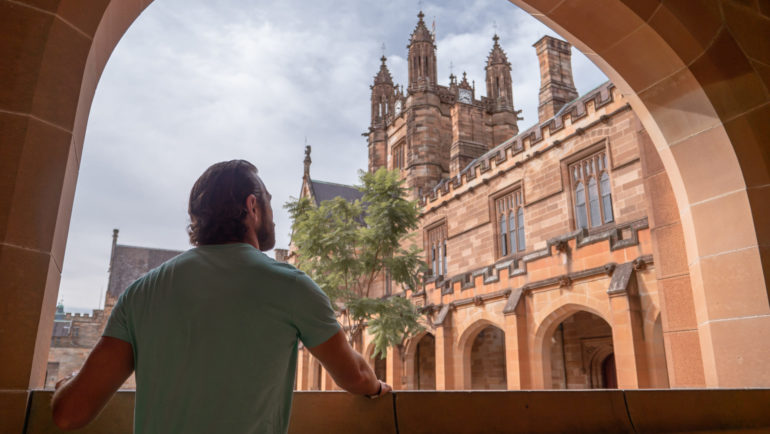When I came to Australia in 2011 to do my MBA at Deakin University in Geelong, I knew nobody.
Even as a trained mechanical engineer in a blue-collar city, jobs were hard to find without local experience. I took entry level roles cleaning and distributing newspapers to make ends meet. I knew I wanted to start my own business, but I had no idea how to get in.
I approached local “Mum and Dad” outfits like restaurants and independent retailers and made my case that my expertise in business processes, automation and lean operations could save them money and time.

Aamir Qutub, founder of Enterprise Monkey
At the beginning I worked cheap, desperate to prove myself. Once client led to another.
In 2013 I worked with a company called Just Wheelie Bins to automate their asset management. Their backroom operations were all still paper based, and errors, oversights and duplications were costing them more than $5000 every single week. I was able to work with them to fix that through digitisation, automation and process optimisation.
As my business grew, I saw that there was not a community of people around me to support my own growth and theirs. I founded the first MeetUp group for entrepreneurs in Geelong with 35 attendees at our first meeting. By the end of the year we had 500.
A rare truth
Over the last decade have made my home in Australia, built my life and grown my business here.
Enterprise Monkey has 24 staff today, and services clients from around Australia and around the world from our offices in Melbourne and Geelong. I’ve become a festival founder, technology investor and government appointee alongside this.
The truth is my story is too rare. Australia is leaving money on the table because we don’t foster the entrepreneurial capabilities of the hundreds of thousands of young people who come here to study. Education is our third biggest export, but we are not taking full advantage of it.
As someone who optimises process and solves problems, this infuriates me. The lack of diversity, the insularity and the inwardness of our entrepreneurial community is a glaring weakness for our economy and our country. Every week I meet international students who have viable business ideas with immense potential. Usually they are working in service stations and restaurants. If they do start their business, they will do it back home where they have access to support networks.
This isn’t just a shame for these potential founders, it’s a shame for Australia. As an entrepreneur and a technology investor, I can very clearly see the blind spots and weaknesses that result from the lack of diversity in our technology ecosystem.
Think global
The size of our market means that Australian technology founders must think globally from day one. Expansion into other markets must come earlier in the process when you’re breaking out of a market of 25 million people than it does for companies in the US, China or India where there is a domestic market of hundreds of millions of potential customers.
By supporting international students to realise their startup visions in Australia instead of back home, we can create a ready-made cohort of people who are already skilled in cross-cultural marketing and have access to established networks in target markets to successfully scale. We can reduce our reliance on scaling into distant markets like the US and UK and increase our ability to scale early stage technology companies into regional markets across Asia which are growing more quickly.
Australia’s research and development capability – which international students both contribute to and benefit from – is a key difference-maker for our technology exports, giving us the edge in areas like sports and health technology. By encouraging the entrepreneurial ambitions of international students in Australia, we can supercharge this existing advantage and export it more quickly and more aggressively.
Some of the changes that are needed are cultural, and others have to happen at a regulatory level. For international students seeking to build a life in Australia, taking a job is a far safer route than starting a business. That’s something we can change so more people can build wealth, create jobs and transform our economy. At a cultural level, we need to support the ambitions of people who come to our world-class universities rather than allowing that entrepreneurial capability to escape us.
As someone who today mentors and advises young entrepreneurs who are in the same position that I was, I want to see my story become more commonplace as our country’s technology ecosystem evolves.
- Aamir Qutub, founder and CEO of Enterprise Monkey He is speaking at the Future Founders Festival, supported by the State Library of Victoria and Study Melbourne, on July 15-16. Register to attend online here




















Trending
Daily startup news and insights, delivered to your inbox.